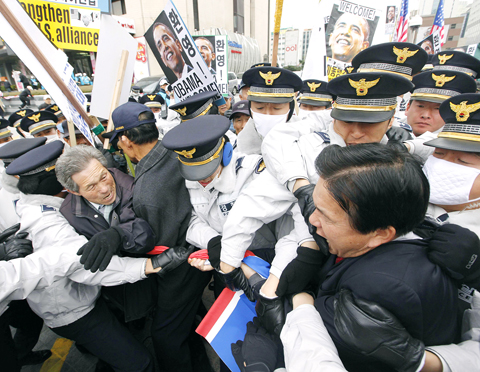US President Barack Obama issued a strong warning to Iran yesterday of consequences of its failure to respond to the offer of a nuclear deal and could have a package of steps to take “within weeks.”
Iran’s foreign minister, however, rejected talk of further sanctions, saying the West had learned from “failed experiences” of the past.
Iran on Wednesday rejected a deal to send enriched uranium abroad for further processing, defying Washington and its allies, which had called on Tehran to accept a deal aimed at delaying Iran’s potential ability to make bombs by at least a year by divesting the country of most of its enriched uranium.

PHOTO: REUTERS
The UN nuclear watchdog, the International Atomic Energy Agency (IAEA), had said Iran should send 75 percent of its low-enriched uranium to Russia and France, where it would be turned into fuel for a Tehran medical research reactor.
“Iran has taken weeks now and has not shown its willingness to say ‘yes’ to this proposal ... and so as a consequence we have begun discussions with our international partners about the importance of having consequences,” Obama said at a joint news conference with South Korean President Lee Myung-bak during a visit to Seoul.
He said Iran would not be given an unlimited amount of time, likening the Iranian nuclear issue to the years of stop-and-start negotiations with North Korea about its nuclear ambitions.
“We weren’t going to duplicate what has happened with North Korea, in which talks just continue forever without any actual resolution to the issue,” said Obama, who has advocated a policy of increased engagement, rather than confrontation, on thorny international issues.
In Manila, visiting Iranian Foreign Minister Manouchehr Mottaki dismissed the possibility of further sanctions.
“Sanction was the literature of the 60s and 70s,” he said at a news conference. “I think they are wise enough not to repeat failed experiences,” he said, speaking through an interpreter. “Of course it’s totally up to them.”
Mottaki said Tehran was willing to discuss the plutonium deal, but only if the swap of enriched uranium for nuclear fuel took place within Iran.
“Iran raises its readiness in order to have further talks within the framework which is presented,” he said.
“It’s not our proposal to have a swap,” he said. “They raised such a proposal and we described and talked about how it could be operationalized.”
Obama said he still hoped Iran would change its mind and that the US and its allies would consider a package of potential steps to indicate to Iran their seriousness.
“Our expectation is that, over the next several weeks, we will be developing a package of potential steps that we could take, that would indicate our seriousness to Iran,” he said.
Meanwhile, the French Foreign Ministry yesterday rejected Iran’s request for more talks to
explore the technical details of a plan to provide fuel for its
reactors.
Foreign ministry spokesman Bernard Valero said dialogue could
continue on Tehran’s nuclear program, but “it will
not touch on the technical issues.
Also See: 9/11 plotter will be convicted: Obama

The US government has signed defense cooperation agreements with Japan and the Philippines to boost the deterrence capabilities of countries in the first island chain, a report by the National Security Bureau (NSB) showed. The main countries on the first island chain include the two nations and Taiwan. The bureau is to present the report at a meeting of the legislature’s Foreign Affairs and National Defense Committee tomorrow. The US military has deployed Typhon missile systems to Japan’s Yamaguchi Prefecture and Zambales province in the Philippines during their joint military exercises. It has also installed NMESIS anti-ship systems in Japan’s Okinawa

TRAGEDY STRIKES TAIPEI: The suspect died after falling off a building after he threw smoke grenades into Taipei Main Station and went on a killing spree in Zhongshan A 27-year-old suspect allegedly threw smoke grenades in Taipei Main Station and then proceeded to Zhongshan MRT Station in a random killing spree that resulted in the death of the suspect and two other civilians, and seven injured, including one in critical condition, as of press time last night. The suspect, identified as a man surnamed Chang Wen (張文), allegedly began the attack at Taipei Main Station, the Taipei Fire Department said, adding that it received a report at 5:24pm that smoke grenades had been thrown in the station. One man in his 50s was rushed to hospital after a cardiac arrest

‘WIN-WIN’: The Philippines, and central and eastern European countries are important potential drone cooperation partners, Minister of Foreign Affairs Lin Chia-lung said Minister of Foreign Affairs Lin Chia-lung (林佳龍) in an interview published yesterday confirmed that there are joint ventures between Taiwan and Poland in the drone industry. Lin made the remark in an exclusive interview with the Chinese-language Liberty Times (the Taipei Times’ sister paper). The government-backed Taiwan Excellence Drone International Business Opportunities Alliance and the Polish Chamber of Unmanned Systems on Wednesday last week signed a memorandum of understanding in Poland to develop a “non-China” supply chain for drones and work together on key technologies. Asked if Taiwan prioritized Poland among central and eastern European countries in drone collaboration, Lin

ON ALERT: Taiwan’s partners would issue warnings if China attempted to use Interpol to target Taiwanese, and the global body has mechanisms to prevent it, an official said China has stationed two to four people specializing in Taiwan affairs at its embassies in several democratic countries to monitor and harass Taiwanese, actions that the host nations would not tolerate, National Security Bureau (NSB) Director-General Tsai Ming-yen (蔡明彥) said yesterday. Tsai made the comments at a meeting of the legislature’s Foreign Affairs and National Defense Committee, which asked him and Minister of National Defense Wellington Koo (顧立雄) to report on potential conflicts in the Taiwan Strait and military preparedness. Democratic Progressive Party (DPP) Legislator Michelle Lin (林楚茵) expressed concern that Beijing has posted personnel from China’s Taiwan Affairs Office to its